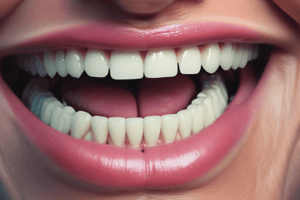Podcast
Questions and Answers
What was the main concern related to the acidic pH during etching?
What was the main concern related to the acidic pH during etching?
- It could lead to immediate tooth decay.
- It will increase dentin sclerosis.
- It may enhance the effectiveness of the material.
- It may cause dissolution of oxalate crystals. (correct)
Which product was found to be effective compared to placebo several weeks after treatment?
Which product was found to be effective compared to placebo several weeks after treatment?
- Colgate Cavity Protection Regular
- Colgate Sensitive Fresh Stripe
- Seal and Protect (correct)
- Vivasens (correct)
In a trial comparing different toothpastes, what was found to be more effective than a professionally applied desensitizing agent?
In a trial comparing different toothpastes, what was found to be more effective than a professionally applied desensitizing agent?
- Desensitizing toothpaste (correct)
- Seal and Protect
- Home products containing potassium nitrate
- Nondesensitizing toothpaste
Which of the following contemporary desensitizing agents offers a potential solution for dentin hypersensitivity?
Which of the following contemporary desensitizing agents offers a potential solution for dentin hypersensitivity?
What long-term effects are thought to reduce dentin hypersensitivity?
What long-term effects are thought to reduce dentin hypersensitivity?
What is the primary characteristic of dentin hypersensitivity?
What is the primary characteristic of dentin hypersensitivity?
Which dental surfaces are most commonly affected by dentin hypersensitivity?
Which dental surfaces are most commonly affected by dentin hypersensitivity?
Which of the following factors is NOT typically associated with dentin hypersensitivity?
Which of the following factors is NOT typically associated with dentin hypersensitivity?
What leads to dentin becoming hypersensitive in affected areas?
What leads to dentin becoming hypersensitive in affected areas?
What type of agents are typically used to alleviate dentin hypersensitivity?
What type of agents are typically used to alleviate dentin hypersensitivity?
What is one method that has been developed for a more lasting solution to dentin hypersensitivity?
What is one method that has been developed for a more lasting solution to dentin hypersensitivity?
What is a potential limitation of applying passive molecules or crystals for dentin hypersensitivity?
What is a potential limitation of applying passive molecules or crystals for dentin hypersensitivity?
Which contemporary desensitizing agent is derived from a mineral similar to tooth structure?
Which contemporary desensitizing agent is derived from a mineral similar to tooth structure?
Which of these agents is specifically cited as having a concentration of 5% for managing teeth sensitivity?
Which of these agents is specifically cited as having a concentration of 5% for managing teeth sensitivity?
Flashcards are hidden until you start studying
Study Notes
Dentin Hypersensitivity
- Characterized by sharp, brief pain in response to stimuli, like heat, cold, touch, and acidity.
- Often occurs on exposed dentin in teeth, especially root surfaces.
- Causes: Excessive brushing, periodontal disease, erosion from dietary or gastric acids.
- Dentin hypersensitivity is likely due to lack of cementum protection, loss of the smear layer, and the hydrodynamic movement of fluid in the dentin tubules.
Management of Dentin Hypersensitivity
- Neural-modulating agents like potassium nitrate can help temporarily.
- Tubule-blocking agents like strontium chloride, oxalates, and dentin bonding agents can also offer temporary relief.
- Biocompatible materials that bond to the root surface provide longer-lasting solutions, for example, calcium sodium phosphosilicate bioactive glass.
- Calcium oxalate and acid-etched bonding material combination products, like BisBlock, seal the dentinal tubules effectively.
- Desensitizing toothpastes containing sodium fluoride and potassium nitrate are shown to be effective.
- Professional desensitizing agents like Seal and Protect can also significantly reduce hypersensitivity.
- Other effective treatments include nano-hydroxyapatite, laser treatment, HEMA and glutaraldehyde primer, 3% oxalate, and home products containing 8% arginine/NaF or 5% potassium nitrate.
Long-Term Prevention of Dentin Hypersensitivity
- Development of a smear layer from tooth brushing can help over time.
- Dentin sclerosis and reactionary dentin formation naturally block tubules.
- Tubule blockage with large endogenous macromolecules can reduce hypersensitivity.
Desensitizing Agents
- Nano-hydroxyapatite is an effective desensitizing agent.
- Laser treatment is an effective desensitizing agent.
- HEMA and glutaraldehyde primer is another effective desensitizing agent.
- 3% Oxalate is also an effective desensitizing agent.
- Home products containing 8% arginine/NaF or 5% potassium nitrate are also deemed effective desensitizing agents.
Studying That Suits You
Use AI to generate personalized quizzes and flashcards to suit your learning preferences.




